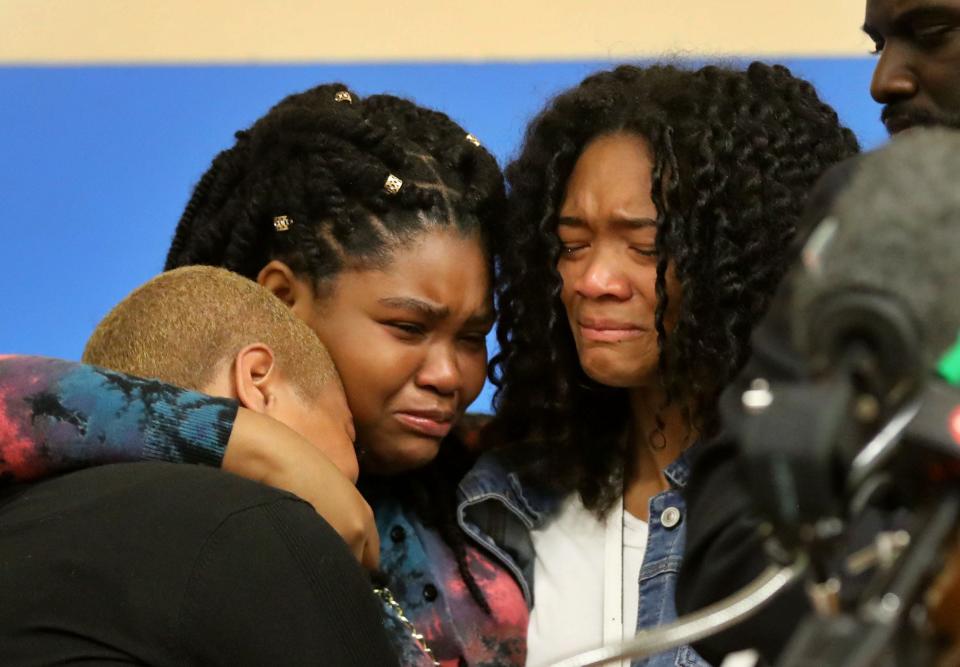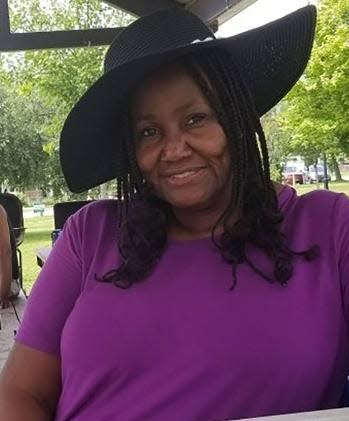'We have a problem in America.' Victims' families speak out after plea in deadly Buffalo Tops shooting case
For the past six months, Zeneta Everhart has ignored the news, whether newspaper or television. She has granted multiple interviews, as she worked to help her son, Zaire Goodman, recuperate from the wounds he suffered when shot in the Buffalo Tops supermarket on May 14.
But she wanted to avoid the traumatic specifics of the horror of that spring day.
On Monday, as she sat in the Buffalo courtroom for the guilty plea of the mass killer who almost robbed her of her son, Everhart could no longer avoid the trauma of the racist massacre. The facts of the attack on each victim — the 10 Black people who were killed and the three wounded survivors — were read aloud as Payton Gendron admitted to each crime.
Gendron, 19, also admitted that his murders were driven by a racist hatred.
"I just needed to be in the space of the person who tried to kill my son," Everhart said at a news conference after the plea. The plea deepened her belief that the United States must find a way to confront a long-entrenched racism at the roots of the killings, she said.

"To me, America showed up in that terrorist tragedy because that is a part of America that Black people see every day," Everhart said.
The families of victims in the mass killing say this should be its lasting message: Racism, when allowed to fester, can erupt violently, a metastatic cancer that, if ignored, turns tragic.
"We have a problem in America and it's much bigger than May 14," said Garnell Whitfield Jr., a former Buffalo fire commissioner, whose mother, 86-year-old Ruth Whitfield, was one of those killed by Gendron.
Whitfield, in fact, spoke of his own cancer of more than two decades ago, one that he at first addressed with holistic methods but finally had to have surgically removed. "I'm here today because I decided to do something about it," he said. "What's America going to do about the cancer of white supremacy?"

Gendron, who was 18 at the time of his assault, found a like-minded community on the web, and posted his own bigoted screed before driving to Buffalo from his Broome County home where, clad in body armor, he wielded an AR-15 and went on the two-minute killing spree that he broadcast live. The video continues to survive on the web, and Gendron has even been praised by racists across the globe.
He targeted the Tops in the east side of Buffalo because it was, his research showed, surrounded by a predominantly Black neighborhood.
"We heard a lot about justice today," Whitfield said after the plea and a news conference with city and law enforcement officials. "... There is no justice unless we talk about what facilitated these murders."
Buffalo police have explained how Gendron, upon seeing a multitude of police respond within minutes of his first shots, apparently realized he was outgunned and surrendered peacefully. But to the victim families his arrest, when compared with some unarmed Black youth who were killed in police confrontations across the country, is telling.
The families admitted that they chafed when they saw Gendron in court, his hair cut neatly for his plea as if he were just another white teenager.

"I have a lot of anger," said Mark Talley, whose mother, Geraldine Talley, was murdered in the Tops. "... I was angry that he didn't have to look at the families' faces," he said of Gendron, whose back was to the families in court.
Talley, a 33-year-old muscular and tall Black man, said he is too often seen as a threat by many, simply because of his race. He said he does not believe he would have survived had he engaged in similar crimes and "the roles were reversed."
"This man got politely escorted out of Tops," Talley said.
Benjamin Crump, a well-known civil rights lawyer representing some of the families, said at the news conference that Gendron succeeded in some of his stated aims: He killed Black people, he survived, and he wanted his proclaimed "manifesto" to receive attention.
"This is a step in the right direction in a journey for justice," Crump said, adding that the families find it "painful that the goals (Gendron) has set out, he accomplished."
Crump, Buffalo lawyer Terrence Connors, and attorney Ken Abbarno, a Buffalo native, are representing several families. They are eyeing litigation against social networks that have been platforms for the the video and the pre-massacre gathering grounds of racists, as well as gun manufacturers and those who allowed the conversion of a legal semi-automatic rifle in New York into an illegal one through the magazines Gendron purchased out of state.
"There will be accountability and it will be more than one chapter of accountability," Connors said Monday.
Said Crump, "It was a lot of other people who loaded that gun."
This article originally appeared on Rochester Democrat and Chronicle: Victims' families speak out after plea in Buffalo Tops shooting case

